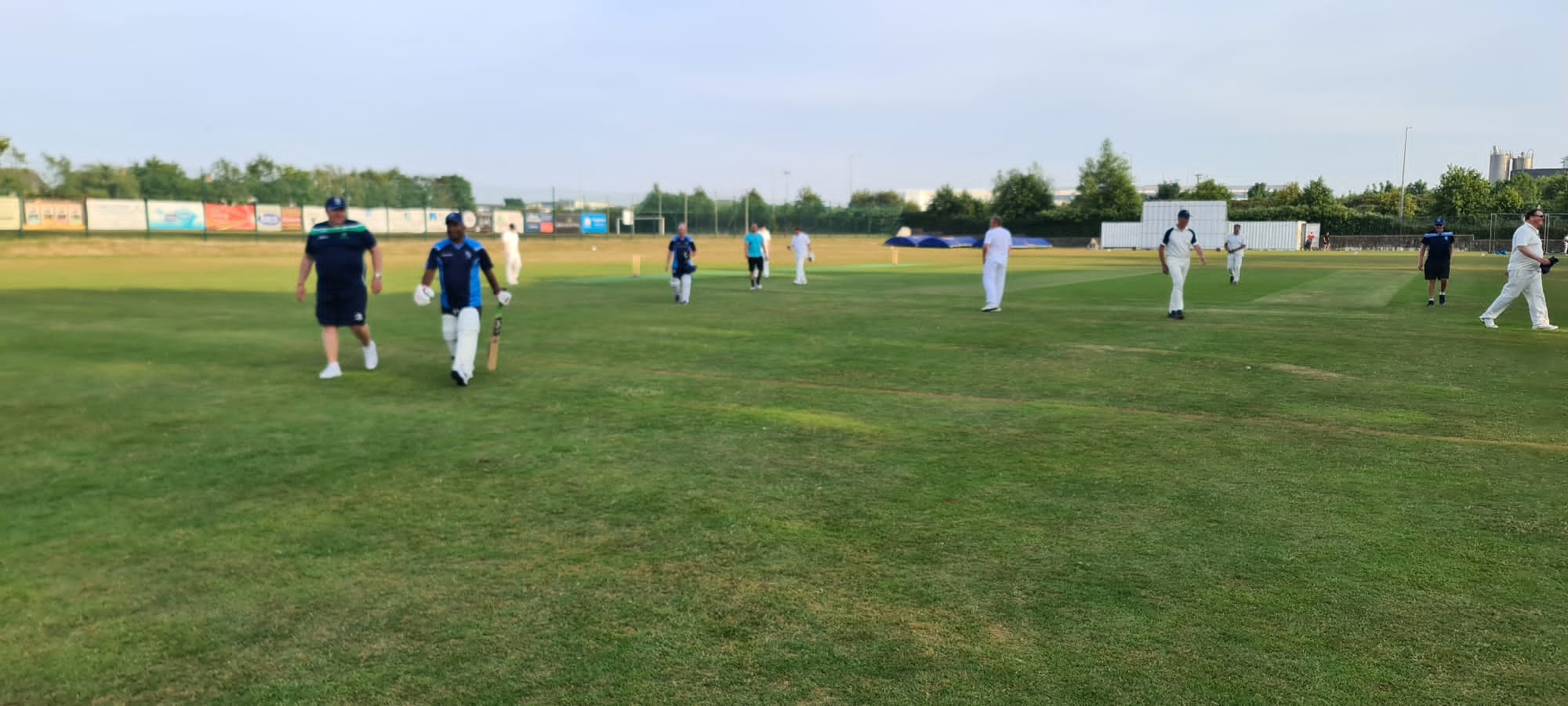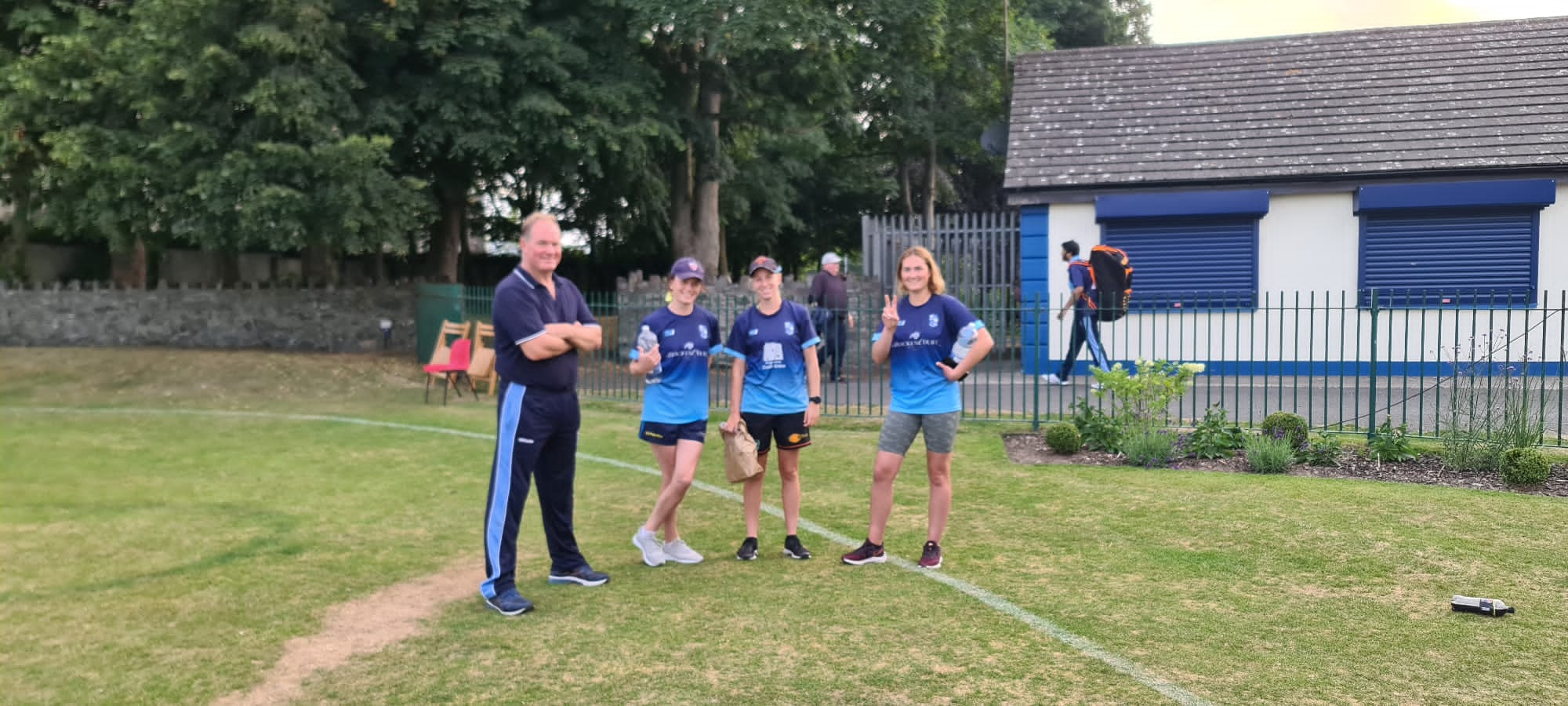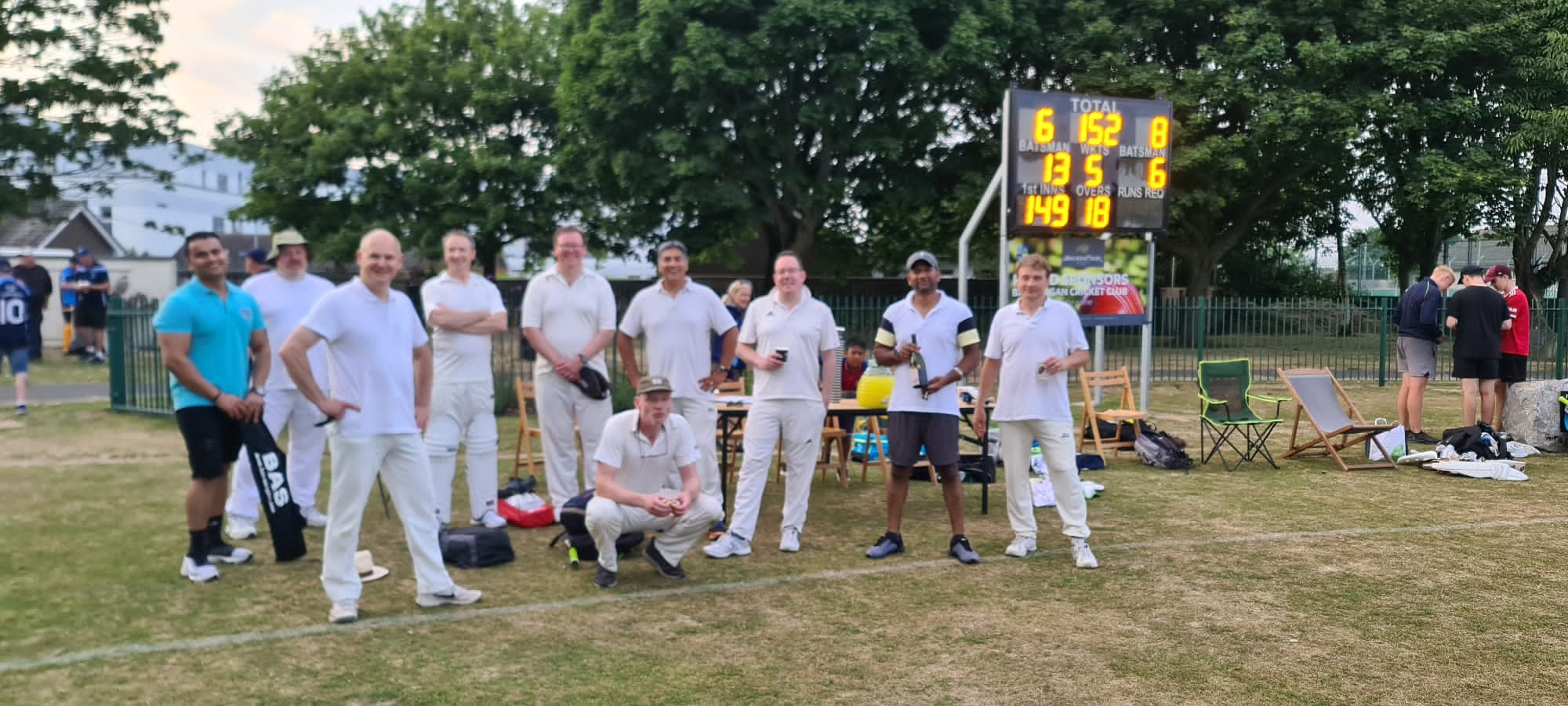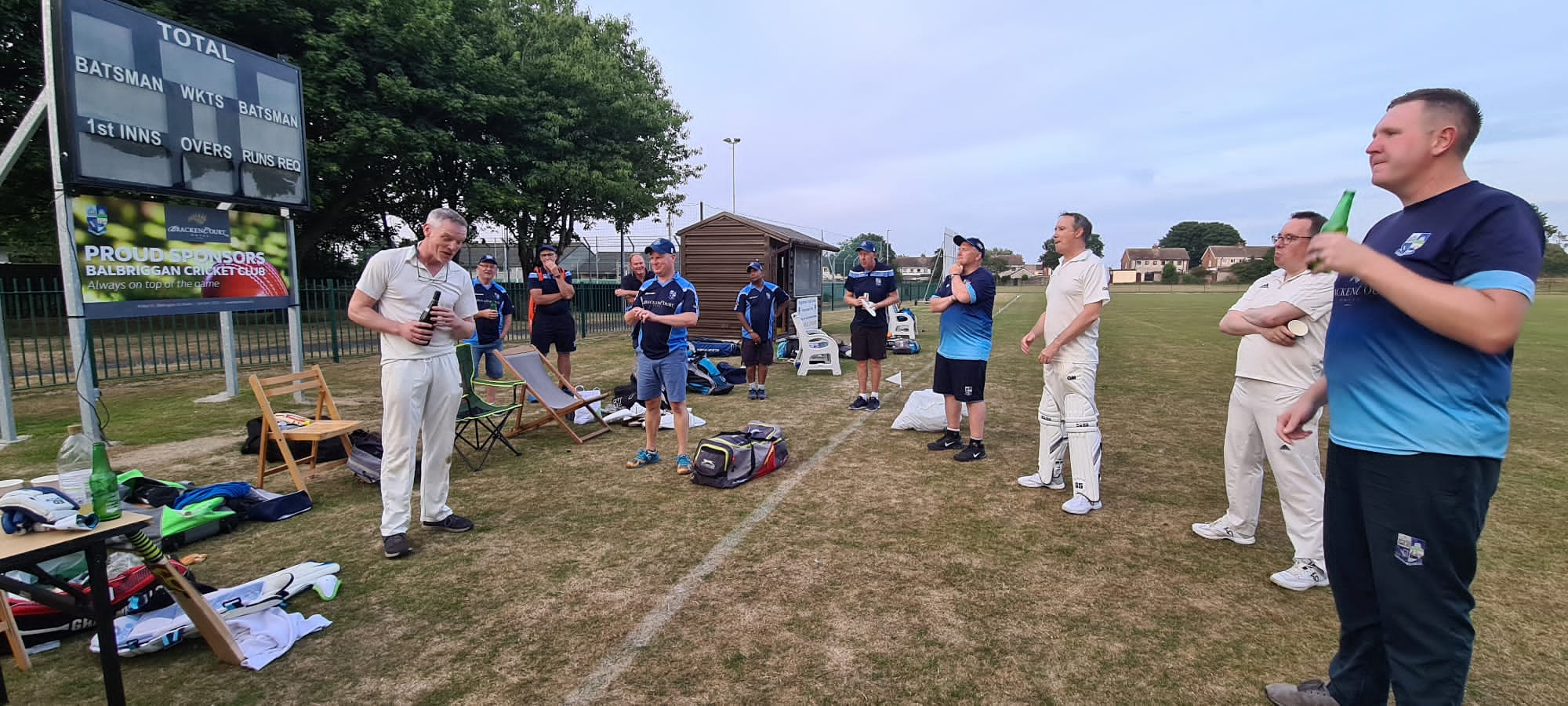Dalkey Archives headed north to Balbriggan on a muggy Friday evening, seven days deep into the longest Irish heatwave in recent history. For those of a certain age, the current weather conditions might have evoked memories of the long hot summer of 1976, when the West Indies trounced England 5-0. Who would be the Calypso Kings tonight? Was there a Whispering Death on either team? And were we about to witness another cricketing massacre?
Dalkey trepidation was multiplied when we saw our opponents all smartly kitted out in blue, as if for some televised limited overs bash. The massive ground was immaculately flat and smooth. The electronic scoreboard looked professional. Were the Archivists out of their depths in the heartland of North Dublin cricket?
Faced with the usual spate of late dropouts, Dalkey welcomed Smith and Mahajan, respective friends and compatriots of Crous and Singh, to their team.
The home team won the toss and elected to bat.
The match ball was untouched and gleaming new. Strongly advised by his cabal of cricketing consiglieries not to waste this pristine new ball, Captain Doris wisely followed recommendations to open the bowling with our fastest bowlers, Singh and Burgess. Singh was particularly optimistic that this ball would swing.
Dalkey hopes were immediately raised by Singh’s opening over that yielded only a single and a bye against a professional-looking opening pair who were both wearing helmets. When the umpire lost count after the first two balls, Dalkey got an early inkling that the kit, the scoreboard and the smooth outfield may have been part of an elaborate psyop. (Although the umpire did later show his respect for the etiquette of the game by walking all the way to the short legside boundary to stub out his cigarette.)
After the first over, it emerged that Dalkey would bowl the first 10 overs from the end with said short legside boundary. Although Burgess managed to contain both openers in his pacy first over, Vikranth opened his shoulders in the third over for two legside boundaries before running out his partner by underestimating the prowess of Crous for a risky single.
Amazingly enough, this was to be the first of a hat-trick runouts by our new Jonty Rhodes, and a saffer to boot. How soon those memories of our last Jonty Rhodes from just the previous Friday fade!
Dalkey celebrations were short-lived as a succession of Balbriggan batsmen peppered the short legside boundary for inevitable retirements. Burgess suffered the indignity of being driven for 6, while Charl was dispatched for 28 off his 2 overs, including 4 boundaries. Rahul restored some respectability by going for 12 off 2, but Gupta was brutalized for 14 off his first over. With Simpson spraying the outfield with his bowling and relying on the umpire’s charity to complete his overs, Dalkey wilted under the punishment and the evening sun.
After 10 overs, Balbriggan were on 88 and threatening to set an unattainable target.
To make matters worse, Dalkey were deprived of their regular closing pair of Monaghan and Taylor.
The tide began to turn when Bennett conceded 2 runs in his first over and provoked another run out, as a frustrated Balbriggan batsman again make the mistake of taking on Crous’s arm at short-midwicket. Encouraged by the bounce that his off-spin was generating, Bennett switched to fast-medium in his second over to maintain the pressure. The success of this strategy was pleasing, but also rather worrying for our own helmetless batsmen.
Suddenly the Archivists had a spring in their step and, when Irwin clean-bowled the dangerous Martin for 13 in his first over (celebrated with a whoop and vigorous fist pump by the bowler), a second wind blew in from the Irish sea. Ably assisted by Smith’s accurate off-spinners at the other end, Irwin took a second wicket in his second over as Tratalos took a smart catch from a top edge off another sharp riser. Balbriggan finished on 149, which is usually regarded as a formidable target. However, they had only scored 14 runs off the last 5 overs and had at one stage threatened a total of well over 180.

Although worried about the bouncy wicket and the lack of helmets, Dalkey were still confident. They had after all scored 151 just the previous week.
Captain Doris was urged by his advisors to find out which end Balbriggan were going to bowl their first 10 overs from and to set his batting order accordingly.
Having been informed that Balbriggan would start from the end with the short boundary, Doris wisely sent in Burgess and Crous as openers and packed the top order with his best batsmen. This tactic paid off spectacularly well as 5 of our first 6 batsmen retired. This was Fredericks, Greenidge, Richards and Lloyd territory. But would Dalkey have the depth to reach the imposing target?
Left-handed and armed with an impressive technique, Crous looked comfortable opening the batting. After taking a few balls to observe the bowling and the mat wicket, he hit two 4s and one 6 in an untroubled innings before retiring on 21. Not just our new Jonty Rhodes, he was now also our Graeme Smith.
Burgess hit only one boundary, but kept the scoreboard ticking over with a series of well-timed dabs and cuts into the offside. Although keen to exploit the short legside boundary, his well-hit drives and flicks to midwicket were frustrated by some fine fielding by the strategically placed Dinesh. In one extraordinary over, Burgess hit 3 consecutive balls straight to Dinesh, prompting the other bored fielders to implore him to hit the ball to someone else.
After retiring on 20, Burgess later returned to the wicket as umpire, paper cup of Pinot in his hand. He even had the impunity to interrupt play a few overs later to demand a refill from beyond the boundary. Singh was happy to oblige our thirsty ambassador.
Singh himself managed an explosive 7-ball retirement, finishing with two successive sixes over the short legside boundary.
Mahajan was unlucky to be run out for 4, bringing together Tratalos and Gupta for a key partnership. Although Dalkey were well ahead on the required run rate, they did have a rather long tail that they would prefer not to expose. Fortunately, Tratalos and Gupta did not disappoint.
The short legside boundary suited Tratalos’s game, as he compiled a pugnacious 20, composed mainly of short-arm pulls to the boundary. Someone foolishly allowed Bennett back to the scoring book and he promptly misattributed a Tratalos 3 to Gupta. The human calculator Tratalos grew increasingly impatient at his unnecessarily prolonged stay at the wicket, but eventually held his nerve to retire on 20.
Gupta was also seeing the ball well and advanced quickly to 18 after 3 powerfully hit boundaries. Whereupon, with a curious mixture of gallantry and bombastic self-confidence, he sent out a message to a gaggle of teenage girls sitting on the deep mid-wicket boundary to take cover. Having so overtly declared his intentions, Gupta proceeded to poke around unconvincingly for a few comedically hubristic balls, before finally finding the boundary far from the bemused girls.
Nonetheless, the size and variety of the watching crowd was an indication of the cricket club’s place in the community. At one end of the ground near the nets, a young woman decked out in Balbriggan blue was coaching a group of under 10 girls. Small groups of young teenage boys also gathered around the boundary to encourage and sledge their seniors, some of whom seem to have been their fathers. Wives and mothers also dotted the boundary’s edge in a clear sign that this was a family-based club. The history of the club was evidenced by plaques at both ends of the ground dedicated to founding members. One of the plaques paid tribute to a co-founder who had “lived and breathed this club”. Subsequent research reveals that both ends were renamed in honour of the two men who had secured the ground and driven the construction of the clubhouse. All a far cry from the rootless and nomadic existence of the Archivists.


Scarcely back beyond the ropes, Gupta launched a charm offensive on the same girls, recruiting them to help operate the electronic scoreboard, a task that was apparently beyond the collective intelligence of the Archivists.

With Tratalos retiring soon after, Dalkey were still comfortable with Irwin and Doris expected to see them home without any further ado. However, the bowlers had now changed ends, so easy legside runs were now a thing of the past. When Irwin was bowled third ball for 0 and Doris fell to a fine catch at deep mid off for 7, the match was on a knife edge. Bennett walked to the wicket with 12 needed from 18 balls, and only Smith, a completely unknown quantity, to come.
Balbriggan also appeared to have withheld their 2 best bowlers until the very end …
The situation brough the best out of Simpson, who responded with a beautifully timed cover drive for 4 to the now short offside boundary. After wasting his free ball with a poorly timed slash for only a single, Bennett then faced a pacy left-armer who was aiming for the left stump with a packed legside field in the match’s penultimate over. Balbriggan were playing smart competitive cricket.
After airily wafting at a ball outside his leg stump, Bennett managed to fend off a rising ball for a quick single to square leg. The phlegmatic Simpson was now in his element and calmly took another single to leave Dalkey 2 short of the total. When Bennett was finally given the ball he had been waiting for - short of a length outside the off stump - , he rocked back on to his back foot before cracking an off drive through the hands of cover point to the short offside boundary. Dalkey had won with 7 balls to spare.

Singh was deservedly awarded Man Of The Match for his fine batting and bowling. The Archives were treated to a delicious barbecue with chilled beers by our generous hosts and it was mutually agreed that this would become an annual fixture. Captain Doris also confidently extended an open invitation to Balbriggan for a return match at St. Andrews, so maybe rumours of our imminent eviction are premature.

[Written by: Nick Bennett]

